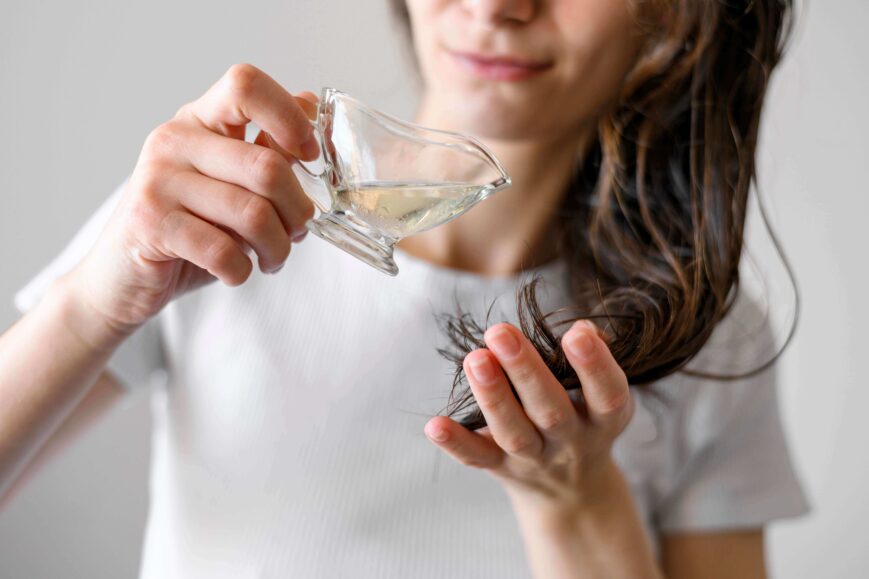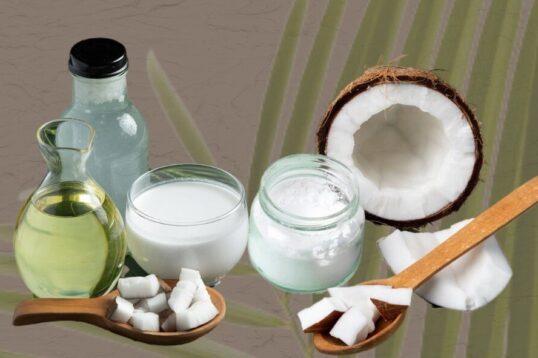Are you annoyed with stops in your hair growth? Handle the Problem Yourself! Find out how to make the BEST hair oil for hair growth oil so your hair grows thicker and faster. Genuine outcomes with natural substances!
We’ll review safety issues, the science behind carrier and essential oils for hair development, and how to create the ideal hair oil blend. See if the homemade best hair oil for growth can be your unique route to healthier, fuller hair.
- Hair oil can help your hair grow faster, thicker, and healthier.
- Creating your own hair growth oil at home is a simple process, using readily available natural ingredients.
- Coconut oil, Castor oil, Almond oil, Olive oil, and Essential oils are some of the best ingredients for hair growth.
- One unique advantage of homemade hair oil is the ability to tailor it to one’s specific hair type and needs.
- You should regularly apply your best hair oil for hair growth oil and Massage your scalp to stimulate blood circulation.
Why Use the Best Hair Oil for Hair Growth?
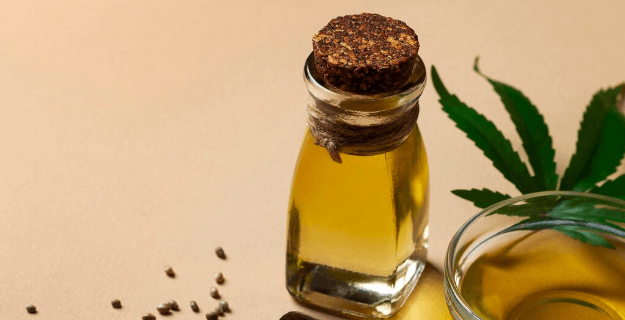
Do you want to have healthy, luscious, and long hair? If yes, then try using hair oil. Hair oil is a natural and effective technique to nurture and encourage hair development. Best Hair oil for hair growth can provide many benefits for your hair, such as:
However, not all hair oils are equal. Some may contain harsh chemicals, artificial perfumes, or mineral oils, which can harm hair and scalp. That’s why making your hair oil at home with natural ingredients is better. You can control what goes into your best hair oil for growth and customize it according to your hair type and needs.
For dry hair, use thicker carrier oils such as argan, avocado, or jojoba.
If you have oily hair, choose for milder carrier oils such as rosehip, almond, or grapeseed oil.
Normal Hair: Because jojoba oil resembles sebum (natural scalp oil), it’s a flexible option.
How to Make the Best Hair Oil for Hair Growth at Home
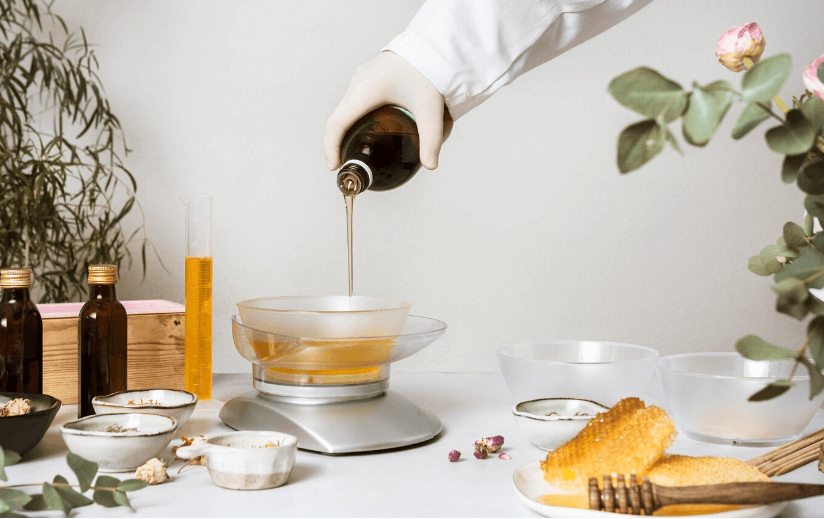
Making your best hair oil for hair growth at home is easy and fun. You only need a few ingredients and tools and can experiment with different combinations and recipes. Here are the basic steps to make your hair oil at home:
Choose your base oil: The base oil is the main ingredient of your hair oil. It should be a carrier oil that can dilute and carry the other ingredients. Some of the best base oils for hair growth are:
Choose your essential oils: The essential oils are the optional ingredients of your hair oil. They can add fragrance and extra benefits to your hair oil. Here are some of the most incredible essential oils for hair growth:
Combine your oils:
The next step is to combine your base and essential oils in a glass bottle or jar. You can measure your oils with a measuring cup or spoon or by eyeballing it. A general rule of thumb is to use 1-2 teaspoons of essential oils for every 1/4 cup of base oil. You can change the ratio based on your preferences and requirements. Here are some examples of hair oil recipes for different hair types and goals:
Shake your oil:
The final step is to shake your oil well before each use. This will help to blend the oils and distribute the benefits evenly. You can also label your oil with the ingredients and the date of making. You can store your best hair oil for growth in a cool, dark place for up to 6 months.
Add herbs to your best hair oil for hair growth: fenugreek seeds, hibiscus flowers, amla (Indian gooseberry), and horsetail.
How to Use Your Best Hair Oil for Hair Growth
Now that you have made your hair oil, you can use it to improve your hair growth and health. Here are some tips on how to use your best hair oil for hair growth:
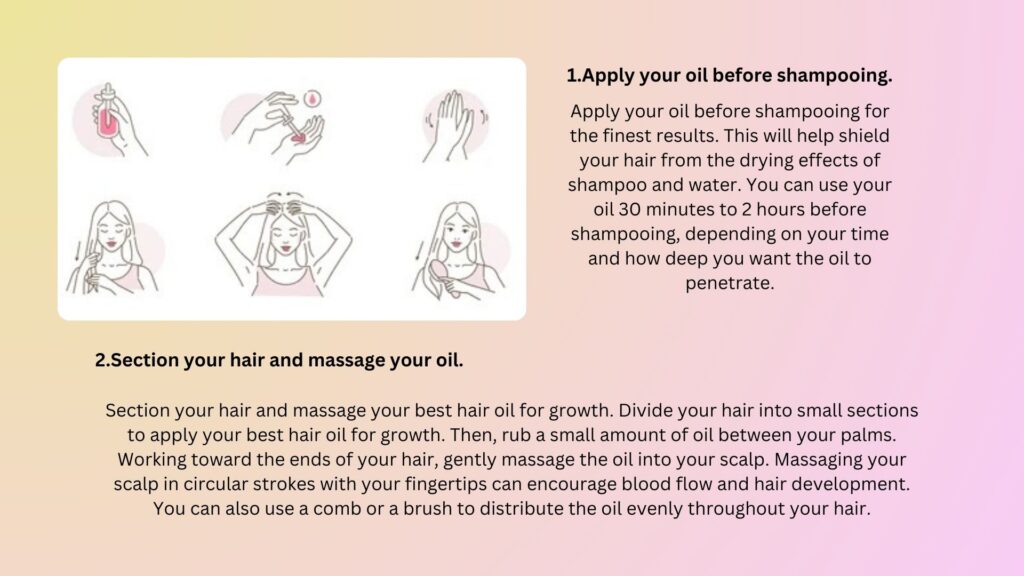
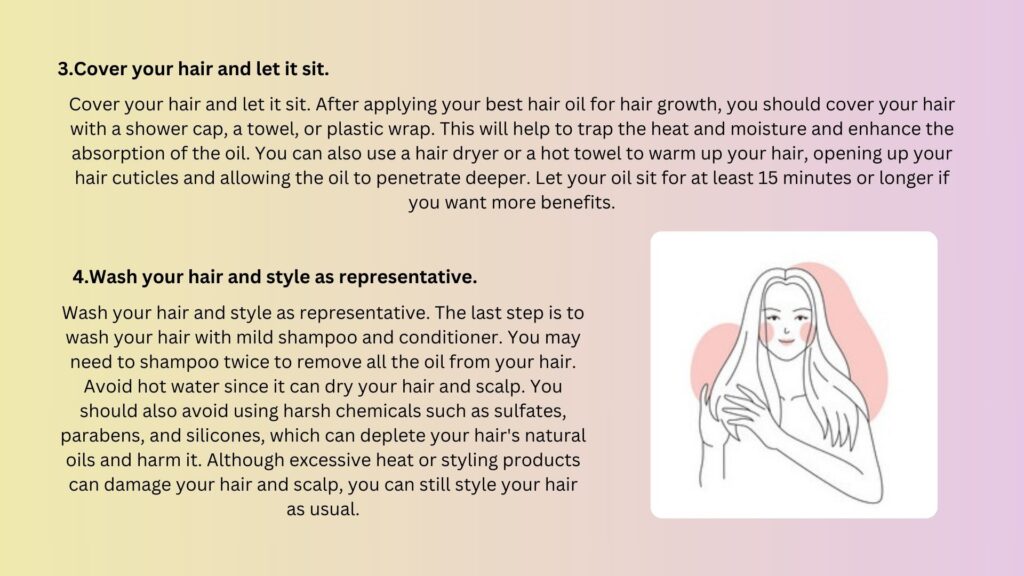
To see the best results, you should regularly use your best hair oil for hair growth, at least once or twice a week. You can also experiment with different oils and recipes to find the best one for your hair. Soon, you will notice that your hair is growing faster, thicker, and healthier. You will also enjoy the unique fragrance and feel of your best hair oil for growth. So, what are you waiting for? Start making your hair oil today and see the difference for yourself!
For further benefits, consider incorporating aloe vera juice or vitamin E oil, among other hair-nourishing components, into your best hair oil for hair growth blend.
Benefits: Best Hair Oil for hair growth

- Coconut oil Moisturizes, conditions, protects, penetrates, and prevents protein loss.
- Black Castor oil Coats, seals, stimulates and activates prostaglandin E2 receptor.
- Almond oil Nourishes softens, improves elasticity, and prevents breakage.
- Olive oil Hydrates, smooths, repairs, and prevents frizz and split ends.
- Rosemary oil Stimulates and increases hair growth, preventing dandruff and hair loss and fighting inflammation and infection.
- Lavender oil Relaxes, promotes hair growth, reduces stress and anxiety, and causes hair loss.
- Peppermint oil Invigorates boosts hair growth, and improves blood flow and oxygen delivery.
- Tea tree oil Cleanses, prevents hair loss, fights bacteria, fungi, and parasites, and causes scalp infections and hair problems.
- Argan oil Nourishes, enhances, and adds shine, softness, and smoothness.
- Lemon oil Brightens, clarifies, removes buildup, and adds freshness and fragrance.
- Aloe vera oil Hydrates, soothes, heals, and reduces inflammation and irritation.
- Chamomile oil Hydrates soothes, heals, and reduces inflammation and irritation.
- Neem oil Cleanses purifies, detoxifies, and eliminates scalp problems.
- Eucalyptus oil Cleanses, purifies, detoxifies, and eliminates scalp problems.
- Sandalwood oil is Gentle and calming and reduces scalp sensitivity and irritation.
You can use these oils alone or with others to make your best hair oil for growth. You can also add other ingredients, such as herbs, spices, or honey, to enhance your hair oil’s effectiveness and aroma. The possibilities are limitless, and you may have fun trying different recipes to find the ideal one for your hair.
To rule out adverse reactions, perform a patch test on the inner arm before applying the best hair oil for hair growth to the scalp.
Conclusion
Hair oil is a beautiful way to improve your hair growth and health. You may produce your best hair oil for hair growth at home using natural ingredients specific to your hair type and needs. You can also enjoy the benefits of your hair oil by applying it regularly and massaging your scalp. You will soon see the difference in your hair’s length, thickness, and quality. You will also love the smell and feel of your best hair oil for growth. So, don’t wait any longer and start making your best hair oil for growth today. You will be amazed by the results!
FAQs Best Hair Oil for hair growth
What is the best hair oil for growth, and how does it promote growth?
Best Hair oil for hair growth is usually manufactured from natural or synthetic oils and applied to the hair and scalp. It can help hydrate the scalp, fortify hair follicles, stop breaking, and increase blood circulation to promote better hair growth.
How can I select the best hair oil for hair growth?
When choosing a hair oil to encourage hair development, consider your hair type (dry, oily, etc.), particular scalp diseases (such as dandruff or scalp psoriasis), and the oil’s contents. Seek oils that strengthen and promote hair development, such as castor, coconut, argan, or rosemary.
How frequently should I apply hair oil for optimal hair growth?
Your hair type and scalp condition determine the frequency of hair oil application. Most people apply the best hair oil for hair growth two to three times weekly. However, people with oily hair might wish to use it less frequently, while individuals with dry hair or scalp might benefit from using it more regularly.
Can the best hair oil for hair growth alone encourage hair development, or do I need additional products?
While the best hair oil for hair growth can benefit your hair care routine, it’s not a magic potion for growth. To get the best results, it’s essential to maintain a balanced diet, steer clear of heat styling and chemical treatments, and use a gentle shampoo and conditioner that conforms to your hair type. Regular haircuts and scalp massages can also play a crucial role in encouraging healthy hair growth, in addition to the nourishment provided by hair oil.
Are there any adverse effects or precautions to take when applying hair oil?
Although hair oil is typically safe for most people, certain substances may cause allergic responses or irritate the scalp in certain people. Always do a patch test before applying a new hair oil, specifically if you have sensitive skin or allergies. Furthermore, remember that using too much oil or putting it on your hair for too long might make it greasy and weigh it down.
